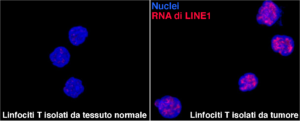The research, coordinated by Beatrice Bodega and Sergio Abrignani, has identified for the first time a new mechanism involving RNA molecules deriving from “repeated elements” of DNA: until a few years ago considered “junk DNA”, they are instead fundamental for the correct function of T lymphocytes, cells at the forefront of the fight against cancer. The publication in Nature Genetics.
Milan, January 18th, 2022 – Non-coding RNA molecules deriving from repeated DNA, considered insignificant until a few years ago, are instead fundamental for the activation and functionality of immune cells, in particular T lymphocytes, and can become a pharmacological target in innovative immunotherapy strategies.
The research has shown that non-coding RNA molecules, considered worthless until recently, are essential for the activation and function of immune cells, in particular CD4 + T lymphocytes. These RNAs derive from highly repeated sequences in our DNA (the LINE1 sequences) that have colonized the human genome, contributing to its evolution.
In particular, the study shows that LINE1 RNAs accumulate in “Naive” type CD4 + T lymphocytes (cells considered immature) and, when these cells are activated, LINE1 RNA molecules decrease drastically. This depends on a different modulation of these molecules in the immature cell and in the differentiated cell, which occurs through a mechanism called splicing of the RNA molecules. The study was conducted on cells deriving from healthy donors and on tumor tissues isolated from cancer patients.
It is known that lymphocytes present in tumors are dysfunctional, indeed no longer able to eliminate cancer cells. Surprisingly, however, tumor-infiltrating CD4 + T lymphocytes re-accumulate LINE1 RNAs and researchers demonstrated that by silencing these RNAs, intratumoral T lymphocytes regain the ability to eliminate neoplastic cells.
Beatrice Bodega and Sergio Abrignani assert “We believe we have identified a potential new therapeutic target to be combined with immunotherapies, exploiting antibodies against the ‘Checkpoint inhibitor’. The next goal is to create a startup that can develop new therapies that, by turning off LINE1 RNA in intratumoral T lymphocytes, can awaken the silent immune system in the tumor microenvironment, so that T lymphocytes can again recognize and destroy neoplastic cells “.
The study was conducted thanks to funding from the Regional Foundation for Biomedical Research (FRRB), the Cariplo Foundation and AIRC – the Italian Association for Cancer Research.



